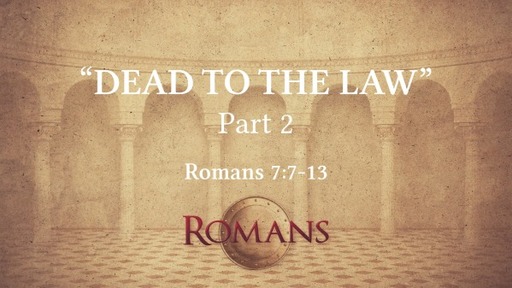"Dead to the Law" (Part 2)

Romans • Sermon • Submitted • Presented • 56:43
0 ratings
· 15 viewsIn Romans 7:7-13 Paul defends the Law of God by explaining it’s true value in revealing sin.
Files
Notes
Transcript
Sermon Tone Analysis
A
D
F
J
S
Emotion
A
C
T
Language
O
C
E
A
E
Social
Balancing the Scale
Balancing the Scale
Paul’s arguments are like this.
He will now add equal counter balance to what he has said (Romans 3:20; Romans 4:15; Romans 5:20; Romans 6:14).
Defending the Law
Defending the Law
Dead to sin (Romans 6:11)
Dead to the law (Romans 7:4, 6)
Also… (Romans 7:5)
So that means… (Romans 7:7)
So here Paul defends the Law and clarifies his statement in 7:5.
This is also the beginning of a personal testimony - 2 parts:
Past (vv. 7-13) - before salvation
Present (vv. 14-25) - after salvation
This is a past general reality that Paul is presently aware of (though he was not then; Philippians 3:6)
Why is the Law not sin? (vv. 7-8)
Why is the Law not sin? (vv. 7-8)
There was a limited knowledge of sin before the Law, but then God gave a specified Law code.
“Know” - further means to understand - known more specifically, more significantly - gain additional knowledge.
Specific example: covetousness - the selfish desire to have someone else’s stuff (Exodus 20:17 ““You shall not covet your neighbor’s house; you shall not covet your neighbor’s wife, or his male servant, or his female servant, or his ox, or his donkey, or anything that is your neighbor’s.””)
Good example of what the law does because...
Easily known - top ten
Not known otherwise
Easy to get away with - heart
Hard to “kick,” always a struggle
Show the depth of sin, the tendency to sin (Colossians 3:5 “Put to death therefore what is earthly in you: sexual immorality, impurity, passion, evil desire, and covetousness, which is idolatry.”)
“Sin” - of covetousness; “commandment” - you shall not covet (v. 8)
“Opportunity” - starting point, base of operations (from which to wage war from)
It’s like that specific command was
“Dead” not active in the same way as it is with the law - dormant or inert
What is the Law’s relationship to sin? (vv. 9-12)
What is the Law’s relationship to sin? (vv. 9-12)
Sin abuses the law, which is good (the law).
Paul is not saying that he was aware of any of this before he was saved, but it was the spiritual reality (as for all).
He may be using himself as a personification of the relationship between sin and the law (Philippians 3:6 “… as to righteousness under the law, blameless.”)
Or, he may have had some awareness of the this relationship between sin and the law because of the law.
“Alive” (v. 9) - or so he thought
“Came” - in the way the Law comes - through knowledge, awareness, understanding - whenever it came
“Life” (v. 10) - if kept (Leviticus 18:5 “You shall therefore keep my statutes and my rules; if a person does them, he shall live by them: I am the Lord.”)
“Proved” - reality
“Deceived” (v. 11) - cheats, tricks - it can be hidden deep in the heart
“The Law is…the commandment is…” because…
It is revealed by God
It is revealed for His purpose
Before he was saved, Paul thought the value of the Law was for justification. But after he was saved, he knew that the value of the law was knowledge of sin.
What is the real problem then? (v. 13)
What is the real problem then? (v. 13)
Sin
“Beyond measure”/ “utterly sinful” (NASB) - extraordinary, extreme
Sinners need to know how bad sin is.
So that we can know how good God is.
The Law of God is another cause for adoration for God.
Benediction: Romans 11:33–36 “Oh, the depth of the riches and wisdom and knowledge of God! How unsearchable are his judgments and how inscrutable his ways! “For who has known the mind of the Lord, or who has been his counselor?” “Or who has given a gift to him that he might be repaid?” For from him and through him and to him are all things. To him be glory forever. Amen.”
Scripture Reading: Philippians 3:1–11